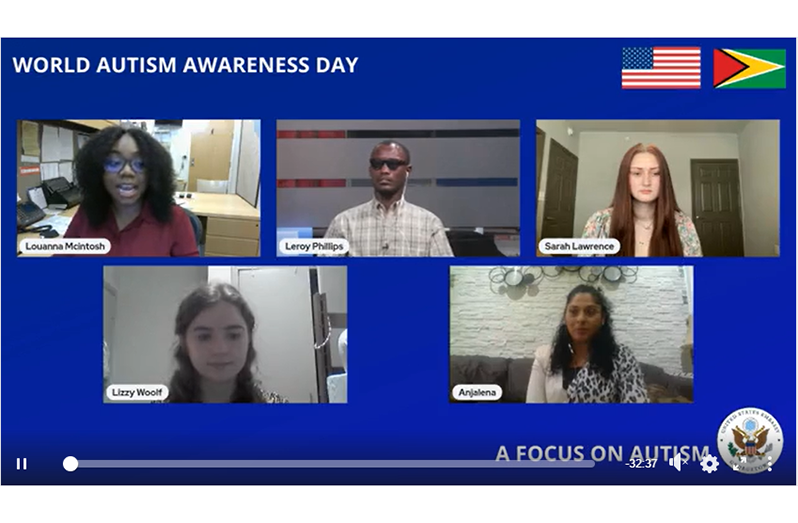By Dillon Goring
AUTISM Spectrum Disorder (ASD) is a complex developmental condition that involves persistent challenges in social interaction, speech and non-verbal communication, and restricted/repetitive behaviours. The effects of ASD and the severity of symptoms are different in each person as quoted by Leroy Phillip of the National Communications Network (NCN) on a programme hosted by the United States Embassy on the observance of World Autism Awareness Day and month, which is being observed in April.
Guyana, over the years, has had to grapple with persons in the school system who had been severely affected by autism.
According to Phillip, a Disability Rights Advocate who works at NCN, Trained Specialists and Professionals are critical in dealing with people with autism.
He also advocated that within the near future, there should be persons in the education system who are professionally trained and specialised to deal with children with ASD.
The panellists also suggested that there should be more persons who are trained in behavioural change to deal with children with autism in Guyana.
“In order to raise awareness to the ordinary Guyanese about autism, we have the power of the media, and we need more programmes like this one to inform Guyanese about autism,” Phillip said.
He also made mention that a more robust programme by the Ministry of Health is needed to talk more about autism.
The Step by Step School, a special autism-focused institution established in September 2011 has played its role in the fight to bring awareness about the disease.
“ Since then, [the Foundation has] grown rapidly, trying to meet the urgent need for such an ambitious, specialised facility designed to educate children diagnosed with autism spectrum disorders (ASDs) in the country. We presently have 11 children, five tutors and one administrator. Run by the Step by Step Foundation, a registered charity in Guyana since 2011, the Step by Step School is registered with Guyana’s National Commission on Disabilities,” said an article posted on the school’s Facebook page.
The article further disclosed that parents play a crucial role in the development of their child; not only do parents need to follow through with the teaching methods used at the school, but they also need to create a wholesome environment for their child’s development.
The school hopes to partner with parents more effectively as resources become available soon. In the meantime, parents have already benefited from workshops and one-to-one chats with our consultant when he visits three to four times a year.
The Chronicle newspaper dated August 31, 2020, reported that Autism Spectrum Disorder (ASD) is a disorder that has no cure; an autistic person will be autistic for the rest of his/her life. Once autism is diagnosed, a specialist doctor or psychologist can teach parents and autistic children how best to get by in life. As the child grows, aspects of the disorder may improve and be replaced by other difficulties that may arise, especially in adolescence and sometimes in adulthood.
Ordinary, everyday people are known as being neuro-typical; they go about their lives talking, laughing, interacting with others, concentrating, working, feeling emotional, happy, sad, and angry, etc. They participate in communication naturally. They use body language, gestures, facial expressions and eye contact without a second thought.
An international study done by the Centre for Disease Control (CDC) in the United States, found that autism occurs more regularly in boys than girls.
The ways in which people with autism learn, think and problem-solve can range from highly skilled to severely challenged. Some people with ASD may require significant support in their daily lives, while others may need less support and, in some cases, live entirely independently.
Several factors may influence the development of autism, and it is often accompanied by sensory sensitivities and medical issues such as gastrointestinal (GI) disorders, seizures or sleep disorders, as well as mental health challenges such as anxiety, depression and attention issues.
Signs of autism usually appear by age two or three. Some associated development delays can appear even earlier, and often, it can be diagnosed as early as 18 months. Research shows that early intervention leads to positive outcomes later in life for people with autism.




.png)









